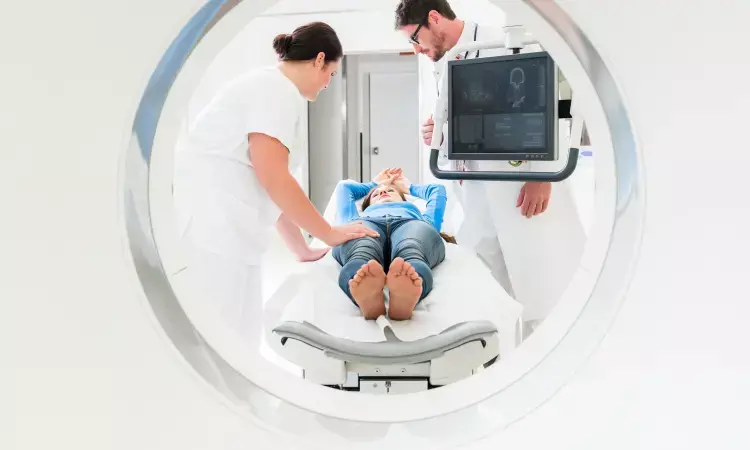- Home
- Medical news & Guidelines
- Anesthesiology
- Cardiology and CTVS
- Critical Care
- Dentistry
- Dermatology
- Diabetes and Endocrinology
- ENT
- Gastroenterology
- Medicine
- Nephrology
- Neurology
- Obstretics-Gynaecology
- Oncology
- Ophthalmology
- Orthopaedics
- Pediatrics-Neonatology
- Psychiatry
- Pulmonology
- Radiology
- Surgery
- Urology
- Laboratory Medicine
- Diet
- Nursing
- Paramedical
- Physiotherapy
- Health news
- Fact Check
- Bone Health Fact Check
- Brain Health Fact Check
- Cancer Related Fact Check
- Child Care Fact Check
- Dental and oral health fact check
- Diabetes and metabolic health fact check
- Diet and Nutrition Fact Check
- Eye and ENT Care Fact Check
- Fitness fact check
- Gut health fact check
- Heart health fact check
- Kidney health fact check
- Medical education fact check
- Men's health fact check
- Respiratory fact check
- Skin and hair care fact check
- Vaccine and Immunization fact check
- Women's health fact check
- AYUSH
- State News
- Andaman and Nicobar Islands
- Andhra Pradesh
- Arunachal Pradesh
- Assam
- Bihar
- Chandigarh
- Chattisgarh
- Dadra and Nagar Haveli
- Daman and Diu
- Delhi
- Goa
- Gujarat
- Haryana
- Himachal Pradesh
- Jammu & Kashmir
- Jharkhand
- Karnataka
- Kerala
- Ladakh
- Lakshadweep
- Madhya Pradesh
- Maharashtra
- Manipur
- Meghalaya
- Mizoram
- Nagaland
- Odisha
- Puducherry
- Punjab
- Rajasthan
- Sikkim
- Tamil Nadu
- Telangana
- Tripura
- Uttar Pradesh
- Uttrakhand
- West Bengal
- Medical Education
- Industry
Chest CT before allogenic stem cell transplantation "uncovers" lung pathologies and improves prognosis

New York: A study published in Transplantation and Cellular Therapy has addressed the importance of screening chest computed tomography (CT ) before Allogenic Hematopoietic Stem Cell Transplantation.
Following the period of post-allogenic hematopoietic stem cell transplantation (alloHSCT), one of the major causes of a higher rate of morbidity and mortality is related to pulmonary complications. The conventional mode of screening includes Chest X-ray (CXR). However, the role of CT in pretransplantation screening remains unknown.
Considering this background, a team of researchers characterized the pretransplantation chest CT findings and explored their impact pertaining to eligibility for transplantation and post-transplantation outcomes in 511 patients (January2013-December 2020).
The study summary includes the following points:
- The most common primary disease was AML (acute myeloid leukaemia), myelodysplastic syndrome, lymphoma and ALL (acute lymphocytic leukemia), constituting 49 %, 23 %, 11 % and 10 %.
- A total of 199 patients, constituting 39 %, had abnormal results in chest CT screening.
- The pulmonary nodule was detected in 78 patients constituting 35 % and was the most frequently seen abnormality.
- After pulmonary nodule, consolidation was the most commonly observed in 42 patients 19%.
- Ground-glass opacification, bronchitis and bronchiolitis, pleural effusion and new primary cancer constituted 15%, 11%, 6% and 2%, respectively.
- In 48 % of patients, Chest X-ray detected abnormalities in those with abnormal chest CT scans.
- For those with abnormal chest CT scans (199 patients), 49% of patients were assessed further before transplantation.
- Pulmonary and infectious diseases consultations constituted 23 % and 24%, respectively.
- 20 % had a lung biopsy, and antimicrobial therapy was started after confirmation of an infection diagnosis in 20% of patients.
- The overall survival, nonrelapse mortality and pulmonary-related mortality were "worse" in those with abnormal chest CT scans than those with normal chest CT scans.
The researchers said, "Our study highlights that pretransplantation screening chest CT is beneficial because it uncovers the invasive infections and underlying malignancies. The risk of serious complications is significantly reduced due to this. This is responsible for planning the most appropriate interventions before alloHSCT.
They also said abnormal CT findings before transplantation worsens the overall prognosis.
Further reading:
https://www.sciencedirect.com/science/article/abs/pii/S2666636723000659
BDS, MDS in Periodontics and Implantology
Dr. Aditi Yadav is a BDS, MDS in Periodontics and Implantology. She has a clinical experience of 5 years as a laser dental surgeon. She also has a Diploma in clinical research and pharmacovigilance and is a Certified data scientist. She is currently working as a content developer in e-health services. Dr. Yadav has a keen interest in Medical Journalism and is actively involved in Medical Research writing.
Dr Kamal Kant Kohli-MBBS, DTCD- a chest specialist with more than 30 years of practice and a flair for writing clinical articles, Dr Kamal Kant Kohli joined Medical Dialogues as a Chief Editor of Medical News. Besides writing articles, as an editor, he proofreads and verifies all the medical content published on Medical Dialogues including those coming from journals, studies,medical conferences,guidelines etc. Email: drkohli@medicaldialogues.in. Contact no. 011-43720751


